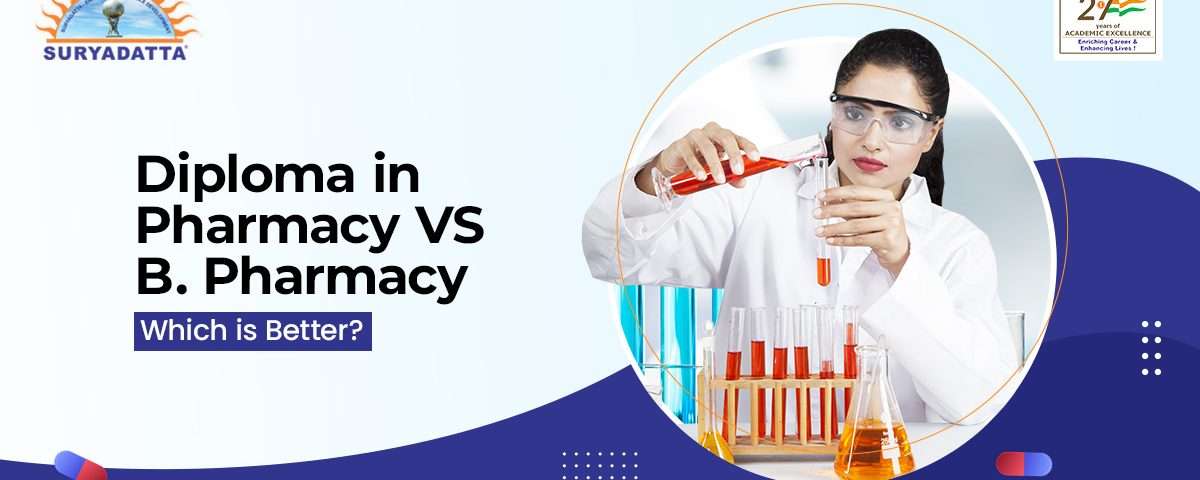Suryadatta College of Pharmacy Healthcare and Research, Bavdhan, Pune
Approved by Pharmacy council of India (PCI- 6470), New Delhi, Recognized by Government of Maharashtra,
Affiliated to MSBTE, Mumbai and DBATU, Lonere.
DTE College Code 6989 for Admission through CAP in D.Pharm & B Pharm.
Diploma in Pharmacy vs. B. Pharmacy: Which is Better?

How to Prepare for Pharmacy Entrance Exams: A Full Guide
July 30, 2025
Career in Pharmacy: Where the Industry Is Heading in 2025
August 12, 2025Understanding the Basics of Pharmacy Courses
Pharmacy degree programs like the Diploma in Pharmacy (D.Pharm) and the Bachelor of Pharmacy (B.Pharm).
Both present very strong foundations but what they lack in time they may make up in in depth study and in career results. The field of pharmacy has grown greatly with a higher demand for professional pharmacists in the hospital, research, manufacturing, and retail fields. If you are thinking to jump into a pharmacy career, it is key that you have this out which route is right for you. We will go into each in detail which is also to help you to choose the one which best suit your goals.
What is a Diploma in Pharmacy (D.Pharm)?
The Diploma in Pharmacy is a short-term program which we have put in place to see that students are prepared for entry level roles in the pharmaceutical field. We see the D.Pharm program to run for a period of two years which is to be followed by an internship in a pharmacy for 500 hours which will take up to 3 months.
For entry into the D.Pharm program students are required to have 10+2 in science which includes Physics, Chemistry and Biology or Math. The course is run by the Pharmacy Council of India (PCI) which presents a condensed syllabus. In D.Pharm we study subjects like Pharmacology, Pharmaceutical Chemistry, Pharmacognosy and Hospital Clinical Pharmacy.
D. Pharm is for students that want to enter the workforce right out of school. It includes work in drug stores, hospital pharmacies, and retail medical settings. Although it may not provide immediate access to high level research positions what it does do is present a strong base for which to build your career from and for further study.
What is a Bachelor of Pharmacy (B.Pharm)?
Bachelor of Pharmacy also known as B.Pharm is a 4-year undergraduate program which delves into the in’s and out’s of pharmaceutical science. Also, for top-notchnts who wish to study about drug development, testing, regulatory affairs and research.
To enter B.Pharm program students should have completed 10+2 in science which includes Physics, Chemistry, and Biology or Math. Also, some colleges may ask that students pass an entrance exam. In terms of syllabus, we see that it includes Biochemistry, Human Anatomy, Medicinal Chemistry, Pharmacokinetics, and Industrial Pharmacy.
The B.Pharm program is designed to give in depth knowledge and put students into roles that go beyond that of a medicine dispenser. Graduates will go into clinical research, quality control, manufacturing and become drug inspectors or pharmacovigilance officers. If your goal is to do well in pharmaceutical research, health care companies, or you are into the pursuit of higher studies, B.Pharm is a better long-term investment.
Course Duration, Curriculum & Structure
In terms of choosing between D.Pharm and B.Pharm what often comes into play is which program’s duration and academic coverage fit best. What you put into and get out of the program’s structure will in turn play a large role in your education and what doors it opens for you.
Who Can Apply for Diploma in Pharmacy?
The Diploma in Pharmacy is a 2-year program which also includes a required internship. It is a more hands on program which also puts focus on basic skills for retail and hospital pharmacy. Also, the shorter duration is what mainly appeals to students who wish to start their career sooner.
On another note, B.Pharm is for four years which is divided into eight semesters. The program is more rigorous in nature which includes a mix of theory and practical lab work and industry exposure. Also, some universities include in their curriculum integrated internship modules or industrial training programs.
If you are short on time and financial resources, D.Pharm may be for you. But if you have the time to devote and wish to explore in great depth the field of pharmaceutical science, B.Pharm is the way to go.
Core Subjects Covered in Both Courses
In the same core subjects, which we present but we see different approach in depth. In D.Pharm what we have is a study of Pharmaceutical Chemistry, Pharmacology, Pharmaceutics and Hospital Pharmacy. We put more into the foundation and practical skills which are to be used in everyday pharmacy practice.
In B.Pharm the same subjects are covered in more depth. For example, in Pharmacology we see more into drug mechanisms, side effects, and drug interactions. In Pharmaceutical Chemistry we have the synthesis of drug molecules and medicinal chemistry and in Pharmacognosy we study natural drug sources in detail.
Thus, in that which is presented by B.Pharm we see a wider range of study which in turn prepares students for speciality roles. It also puts an emphasis on critical thinking, problem solving and innovation.
Eligibility Criteria & Admission Process
Admission requirements fluctuate by course. To do better at navigating them get a good understanding also to avoid at the end — senior year type confusion with the college application process.
Who Can Apply for Diploma in Pharmacy?
To enter a Diploma in Pharmacy program students should have completed 10+2 or equivalent in science which includes Physics, Chemistry and Biology or Mathematics. Also, some institutions conduct interviews or entrance tests but many offer direct admission based on merit.
This program is for students that wish to enter the pharmaceutical field early out at age 17 or over at the time of enrolment.
Who is Eligible for B.Pharmacy?
To be a Bachelor of Pharmacy, one must have 12th in science which includes Physics and Chemistry along with either Biology or Math. Also, many top-notch colleges and universities conduct entrance exams which are MHT-CET, GPAT or state level tests.
The admissions process also includes of counseling rounds and document verification. In most cases strong academic performance in science subjects is required for to secure a seat in a top institution.
Entrance Exams and Direct Admissions for Both
Some institutions provide direct admission into D.Pharm based on 12th board marks. For B.Pharm we see more of entrance exams, for government and prestigious private schools. Also, some universities put forward management quota or NRI seats which are few and expensive.
Pre for entrance exams which are GPAT or MHT-CET may require enrolling in a coaching class and dedicated study. Also, it is a wise move for students to plan out their application strategy at an early stage.
Career Opportunities after Pharmacy Courses
The pharmaceutical field is very wide in terms of career options. What you choose in terms of your career path is mostly determined by the level of education you attain.
Job Options after D.Pharm
Graduands of Diploma in Pharmacy go to work in retail or hospital pharmacies as licensed pharmacists. Also, they may do the role of medical representative, pharmacy assistant or drug store supervisor. D.Pharm holders can open their own medical store after they register with the state pharmacy council.
This course is excellent for students looking to get into the field right away which may not require a few years of study. Also bear in mind that roles may be a little more limited to front end pharmacy services.
Career Scope after B.Pharm
B.Pharmacists report to have a wide range of options for their careers. They work in pharmaceutical manufacturing, clinical trials, quality control, regulatory affairs, and R&D. Also available to them are roles like drug inspector, clinical research associate, and production chemist.
In the program you may also go on to do a M.Pharm, an MBA, or head out into academic research. Also, our graduates go to work in the biotech, cosmetics, food, and nutraceutical industries.
Which Course Has Better Career Growth Potential?
In terms of career rewards both fields do well but B.Pharm has better growth which we see in the long term it includes managerial and research roles. D.Pharm on the other hand has a quicker access to the job market but in terms of going higher in the career structure it is limited which only changes if you get more education.
Salary Comparison Between D.Pharm and B.Pharm Graduates
Salary ranges greatly by location, industry, and role.
Entry-Level Salary for D.Pharm Professionals
D.Pharm techs which is what I’ll call them usually start out at salaries which range from ₹1.8 to ₹2.5 LPA. In retail pharmacy, hospitals and dispensary settings you’ll see that this is the primary range. As you gain more experience your income may see an increase also especially if you end up managing a business or store.
Pay Scale for B.Pharmacy Graduates
B.Pharm graduates at start out in the range of ₹3 to ₹4.5 LPA in entry level positions. In fields of clinical research, manufacturing and pharma sales we see salaries increase with experience. Also, those that go back for more study do better.
Long-Term Earning Potential in Both Paths
In the long term, B.Pharm has better earning potential which is a result of access to specialized roles. D.Pharm may also do well when paired with business acumen and experience.
Skills Developed in D.Pharm vs B.Pharm
In terms of content and which skills are covered the programs differ.
Technical & Practical Skills in Diploma Course
D.Pharm focuses on practical aspects of pharmacy which include drug dispensing, inventory control, and patient counseling. Students in the program learn to fill prescriptions, compound drugs and to comply with regulatory requirements.
These are the skills that fit well for positions in hospital and community pharmacy.
Research & Analytical Skills in B.Pharm Course
B.Pharm provides students with the ability to develop analytical and research skills. We do lab work, formulate drugs and use very advanced equipment. Also, we teach them clinical study conduct and drug interaction in complex systems.
This is true of students that are preparing for scientific, industrial, and regulatory careers.
Which Course is Better for You? D.Pharm or B.Pharm?
There isn’t one-size-fits-all solution. Your goal dictates the right choice.
Factors to Consider While Choosing
Important considerations are time, monetary investment, research interest, and career goals. If you are in a rush to enter the profession, D.Pharm would be your choice. If you want to pursue higher positions in pharma firms or R&D, go for B.Pharm.
Who Should Go for a Diploma & Who Should Opt for a Degree?
Select D.Pharm if you desire a shorter course and instant employment. Select B.Pharm if you desire long-term development and multifarious opportunities. Analyze your strengths and prospects before deciding.
Learn More About Accredited Pharmacy Courses in Pune
Discover career-oriented pharmacy education, experienced faculty, and organized curriculum at Suryadatta College of Pharmacy, Healthcare & Research (SCPHR). Know more about Career in Pharmacy to proceed further.
Final Thoughts:
The pharmacy sector is large and promising. Both B.Pharm and D.Pharm are useful, but the suitable course is according to your long-term aspirations.
Summary of Key Differences Between D.Pharm and B.Pharm
D.Pharm is short, utilitarian, and employable. B.Pharm is long, comprehensive, and more employable. One provides quickness; the other provides breadth. Both are equally good ways to make it in life.
Future Trends in Pharmacy and What They Mean for You
With biotech, personalized medicine, and AI coming into the pharma space, there’s a growing need for trained professionals. Pharmacists of tomorrow should be technologically proficient, ethical, and perpetual learners. Make informed choices, and the pharmacy community shall open its doors to you.


